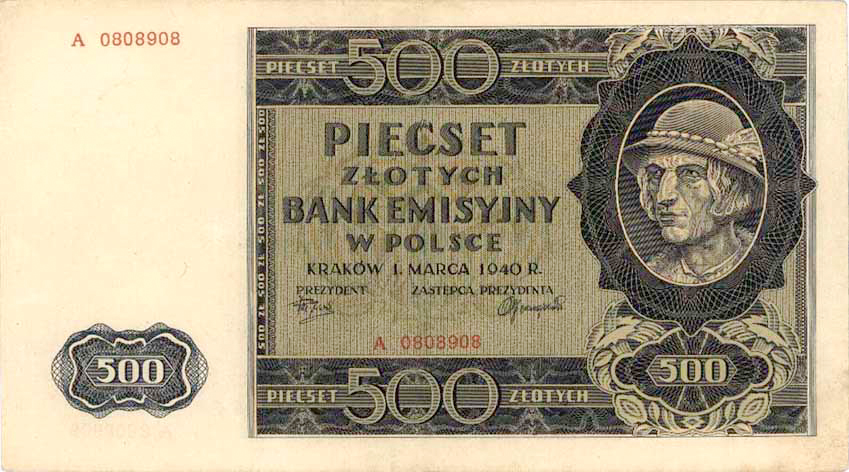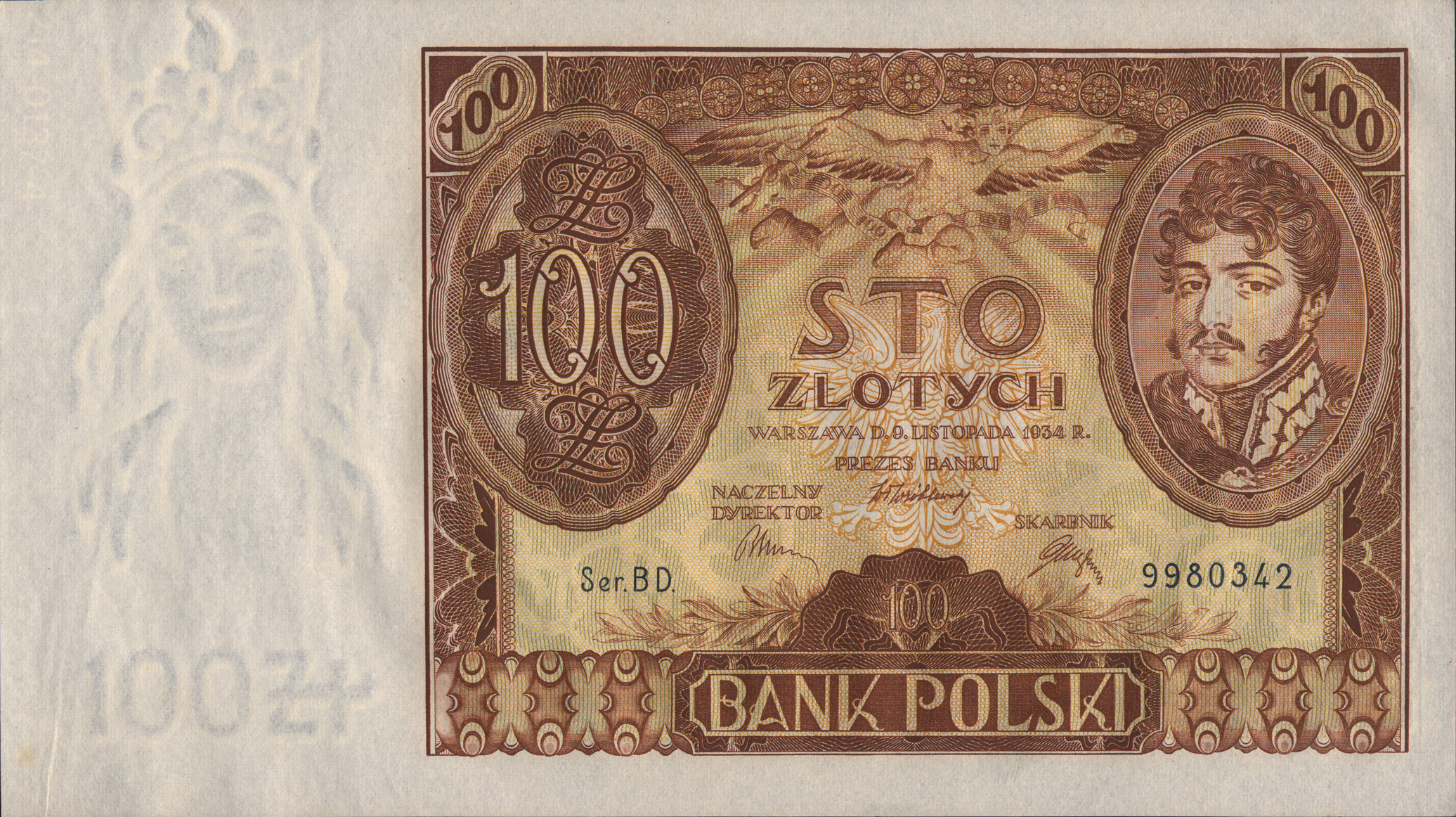|
Feliks Młynarski
Feliks Młynarski (20 November 1884 – 13 April 1972) was a Polish banker, philosopher and economist. Biography Feliks Młynarski was born to Jan Młynarski, a school teacher, and Honorate née Jędrzejowska. He attended a gymnasium in Jarosław, but because of his involvement in organizing meetings in favor of Polish independence, he was expelled by the Austrian authorities, and had to finish his secondary education at a school in Sanok, in 1903. Młynarski finished the Jagiellonian University in Poland. As a youth, he was active in the ''endecja'' movement, but broke ranks with it prior to World War I due to its leader Roman Dmowski's pro-Russian orientation. In 1914 he joined Polish Legions, and spent some time in the United States recruiting members for the Legions from among the American Polonia. After the war he joined the newly formed government of the Second Polish Republic. In the years 1921–1923 he directed the Emigration Office. From 1923 he was employed at the ... [...More Info...] [...Related Items...] OR: [Wikipedia] [Google] [Baidu] |
Feliks Młynarski
Feliks Młynarski (20 November 1884 – 13 April 1972) was a Polish banker, philosopher and economist. Biography Feliks Młynarski was born to Jan Młynarski, a school teacher, and Honorate née Jędrzejowska. He attended a gymnasium in Jarosław, but because of his involvement in organizing meetings in favor of Polish independence, he was expelled by the Austrian authorities, and had to finish his secondary education at a school in Sanok, in 1903. Młynarski finished the Jagiellonian University in Poland. As a youth, he was active in the ''endecja'' movement, but broke ranks with it prior to World War I due to its leader Roman Dmowski's pro-Russian orientation. In 1914 he joined Polish Legions, and spent some time in the United States recruiting members for the Legions from among the American Polonia. After the war he joined the newly formed government of the Second Polish Republic. In the years 1921–1923 he directed the Emigration Office. From 1923 he was employed at the ... [...More Info...] [...Related Items...] OR: [Wikipedia] [Google] [Baidu] |
Warsaw Trade Academy
SGH Warsaw School of Economics ( pl, Szkoła Główna Handlowa w Warszawie, ''SGH''''Statut Szkoły Głównej Handlowej w Warszawie.'' Szkoła Główna Handlowa w Warszawie.) is the oldest and most prestigious in . SGH Warsaw School of Economics was founded in 1906 as a private school under the name ''August Zieliński Private Trade Courses for Men''. On 30 July 1919 it became a separate legal entity and was granted the status of an [...More Info...] [...Related Items...] OR: [Wikipedia] [Google] [Baidu] |
1884 Births
Events January–March * January 4 – The Fabian Society is founded in London. * January 5 – Gilbert and Sullivan's ''Princess Ida'' premières at the Savoy Theatre, London. * January 18 – Dr. William Price attempts to cremate his dead baby son, Iesu Grist, in Wales. Later tried and acquitted on the grounds that cremation is not contrary to English law, he is thus able to carry out the ceremony (the first in the United Kingdom in modern times) on March 14, setting a legal precedent. * February 1 – ''A New English Dictionary on historical principles, part 1'' (edited by James A. H. Murray), the first fascicle of what will become ''The Oxford English Dictionary'', is published in England. * February 5 – Derby County Football Club is founded in England. * March 13 – The siege of Khartoum, Sudan, begins (ends on January 26, 1885). * March 28 – Prince Leopold, the youngest son and the eighth child of Queen Victoria and Pr ... [...More Info...] [...Related Items...] OR: [Wikipedia] [Google] [Baidu] |
Barry Eichengreen
Barry Julian Eichengreen (born 1952) is an American economist and economic historian who holds the title of George C. Pardee and Helen N. Pardee Professor of Economics and Political Science at the University of California, Berkeley, where he has taught since 1987. Eichengreen currently serves as a research associate at the National Bureau of Economic Research and as a Research Fellow at the Centre for Economic Policy Research. Eichengreen's mother was Lucille Eichengreen, a Holocaust survivor and author. Career Eichengreen has done research and published widely on the history and current operation of the international monetary and financial system. He received his A.B. from UC Santa Cruz in 1974. an M.A. in economics, an M.Phil. in economics, an M.A. in history, and a Ph.D. in economics from Yale University in New Haven, Connecticut. He was a senior policy advisor to the International Monetary Fund in 1997 and 1998, although he has since been critical of the IMF. In 1997, he ... [...More Info...] [...Related Items...] OR: [Wikipedia] [Google] [Baidu] |
Triffin Dilemma
The Triffin dilemma or Triffin paradox is the conflict of economic interests that arises between short-term domestic and long-term international objectives for countries whose currencies serve as global reserve currencies. This dilemma was identified in the 1960s by Belgian-American economist Robert Triffin, who pointed out that the country whose currency, being the global reserve currency, foreign nations wish to hold, must be willing to supply the world with an extra supply of its currency to fulfil world demand for these foreign exchange reserves, leading to a trade deficit. The use of a national currency, such as the U.S. dollar, as global reserve currency leads to tension between its national and global monetary policy. This is reflected in fundamental imbalances in the balance of payments on the current account, as some goals require an outflow of dollars from the United States, while others require an inflow. The Triffin dilemma is usually cited to articulate the problems ... [...More Info...] [...Related Items...] OR: [Wikipedia] [Google] [Baidu] |
Bretton Woods System
The Bretton Woods system of monetary management established the rules for commercial and financial relations among the United States, Canada, Western European countries, Australia, and Japan after the 1944 Bretton Woods Agreement. The Bretton Woods system was the first example of a fully negotiated monetary order intended to govern monetary relations among independent states. The Bretton Woods system required countries to guarantee convertibility of their currencies into U.S. dollars to within 1% of fixed parity rates, with the dollar convertible to gold bullion for foreign governments and central banks at US$35 per troy ounce of fine gold (or 0.88867 gram fine gold per dollar). It also envisioned greater cooperation among countries in order to prevent future competitive devaluations, and thus established the International Monetary Fund (IMF) to monitor exchange rates and lend reserve currencies to nations with balance of payments deficits. Preparing to rebuild the interna ... [...More Info...] [...Related Items...] OR: [Wikipedia] [Google] [Baidu] |
Robert Triffin
Robert, Baron Triffin (5 October 1911 – 23 February 1993) was a Belgian-American economist best known for his critique of the Bretton Woods system of fixed currency exchange rates. His critique became known later as Triffin's dilemma. Life After completing his undergraduate studies at the Catholic University of Leuven, Triffin, a Francophone Belgian, went to the US and received his PhD from Harvard University in 1938 and taught there from 1939 until 1942. He held positions in the US Federal Reserve System (1942–1946), the International Monetary Fund (1946–1948), and the Organisation for European Economic Co-operation (1948–1951), now the OECD. In 1951, he became a professor of economics at Yale University, where he also served as Master of Berkeley College from 1969 until 1977. Triffin became a US citizen in 1942. He reclaimed his Belgian citizenship in 1977 and returned to reside in Europe. There, he was a staunch supporter of European integration and helped to develo ... [...More Info...] [...Related Items...] OR: [Wikipedia] [Google] [Baidu] |
People's Republic Of Poland
The Polish People's Republic ( pl, Polska Rzeczpospolita Ludowa, PRL) was a country in Central Europe that existed from 1947 to 1989 as the predecessor of the modern Republic of Poland. With a population of approximately 37.9 million near the end of its existence, it was the second-most populous communist and Eastern Bloc country in Europe. It was also one of the main signatories of the Warsaw Pact alliance. The largest city and official capital since 1947 was Warsaw, followed by the industrial city of Łódź and cultural city of Kraków. The country was bordered by the Baltic Sea to the north, the Soviet Union to the east, Czechoslovakia to the south, and East Germany to the west. The Polish People's Republic was a socialist one-party state, with a unitary Marxist–Leninist government headed by the Polish United Workers' Party (PZPR). The country's official name was the "Republic of Poland" (') between 1947 and 1952 in accordance with the transitional Small Constitutio ... [...More Info...] [...Related Items...] OR: [Wikipedia] [Google] [Baidu] |
Polish Academy Of Science
The Polish Academy of Sciences ( pl, Polska Akademia Nauk, PAN) is a Polish state-sponsored institution of higher learning. Headquartered in Warsaw, it is responsible for spearheading the development of science across the country by a society of distinguished scholars and a network of research institutes. It was established in 1951, during the early period of the Polish People's Republic following World War II. History The Polish Academy of Sciences is a Polish state-sponsored institution of higher learning, headquartered in Warsaw, that was established by the merger of earlier science societies, including the Polish Academy of Learning (''Polska Akademia Umiejętności'', abbreviated ''PAU''), with its seat in Kraków, and the Warsaw Society of Friends of Learning (Science), which had been founded in the late 18th century. The Polish Academy of Sciences functions as a learned society acting through an elected assembly of leading scholars and research institutions. The Academy h ... [...More Info...] [...Related Items...] OR: [Wikipedia] [Google] [Baidu] |
Młynarki
Młynarki was the popular name for the currency notes of the General Government ( part of German-occupied Poland) during World War II that were issued by the German-controlled Bank of Issue in Poland. They were named after the president of the bank, Feliks Młynarski. History After the German invasion of Poland and the ensuing occupation, the Reichsbank decided not to introduce German currency there, as it did not want to increase the money supply. Various Polish banks and credit institutions were temporarily closed, while some of their assets were nationalized by the German government. Many people lost their savings. On 15 December 1939, Hans Frank, the governor of the General Government, an administrative unit for most of occupied Poland, passed a decree creating a new bank, the Bank of Issue in Poland (Bank Emisyjny), which began operating in April 1940. The bank was headed by Feliks Młynarski with the approval of the Polish government-in-exile. The official exchange ra ... [...More Info...] [...Related Items...] OR: [Wikipedia] [Google] [Baidu] |
Bank Of Issue In Poland
Bank of Issue in Poland ( pl, Bank Emisyjny w Polsce, german: Emissionbank in Polen, also translated into English variously as the ''Bank of Issue'', ''Issue Bank'', ''Issuing Bank'' or ''Emitting Bank in Poland'') was a bank created by Nazi Germany in the General Government (Occupation of Poland (1939–1945), occupied Poland) in 1940.Jerzy Jan Lerski, Piotr Wróbel, Richard J. Kozicki, ''Historical Dictionary of Poland, 966-1945'', Greenwood Publishing Group, 1996, Google Print, p. 26/ref> Creation After the German invasion of Poland, the Reichsbank decided not to introduce German currency there, as it did not want to increase the money supply. Instead, it introduced a system of Reichskreditkassen (''credit offices of the German Reich (1933-1945), German Reich''), which issued temporary bonds. This system, intended to be temporary from the beginning, was to be replaced by a new German-controlled currency and central banks in occupied territories.Andrzej Gójski, ''Etapy i cele nie ... [...More Info...] [...Related Items...] OR: [Wikipedia] [Google] [Baidu] |





